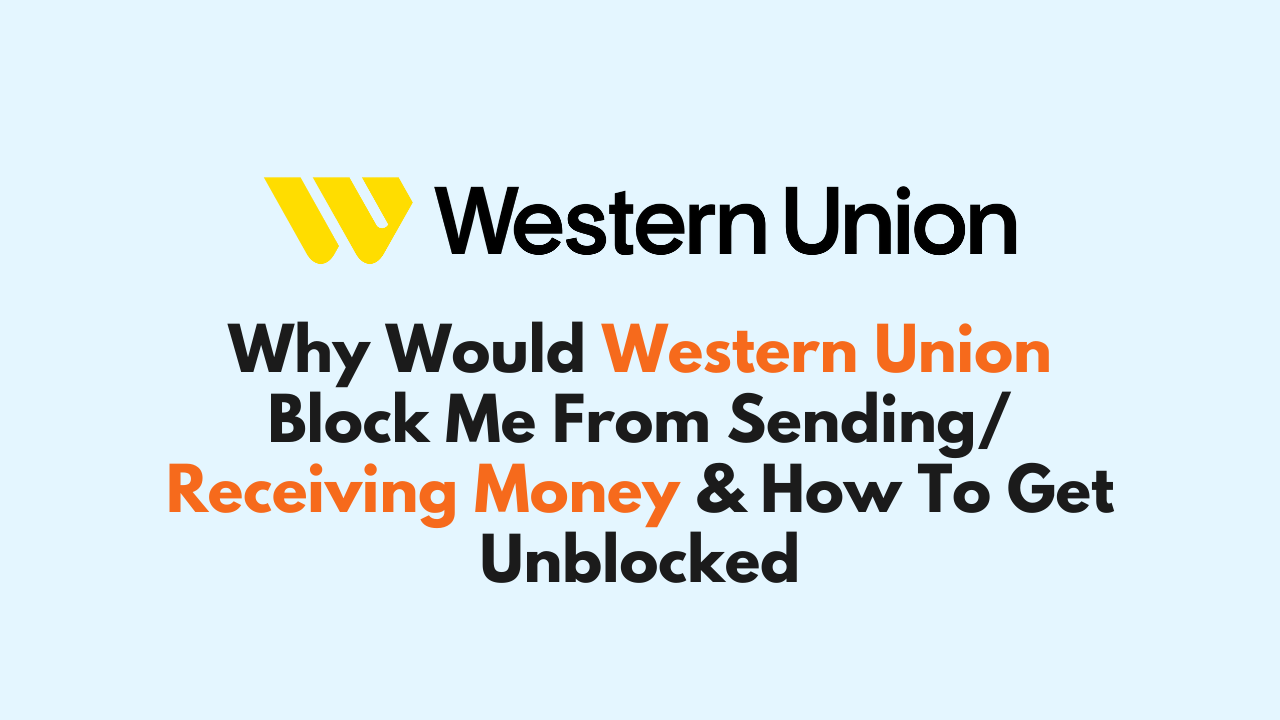Western Union is a popular money transfer service that allows people to send and receive money all over the world.
However, there are instances where Western Union may block you from sending or receiving money.
This can be a frustrating experience, especially if you rely on the service to transfer funds to friends and family or conduct business transactions.
In this article, we will explore the reasons why Western Union may block you from sending or receiving money, how long the block may last, and most importantly, how you can get unblocked from Western Union.
why would Western Union block me from sending money?
Western Union may block you from sending or receiving money for various reasons, including:
1. Incomplete or inconsistent information
Incomplete or inconsistent information is one of the most common reasons why Western Union may block you from sending or receiving money.
Western Union requires accurate and up-to-date information to ensure that the transaction is legitimate and to prevent fraud or errors.
When sending or receiving money through Western Union, the sender must provide accurate information about the recipient, including their name, address, and identification information.

If any of this information is incomplete or inconsistent, Western Union may block the transaction to prevent fraud or errors.
For example, if the sender misspells the recipient’s name or provides an incorrect address, Western Union may block the transaction until the correct information is provided.
This is because incorrect information can lead to the money being sent to the wrong person or location, resulting in financial losses for the sender and recipient.
Similarly, when receiving money through Western Union, the recipient must provide accurate information about themselves, including their name, address, and identification information.
If any of this information is incomplete or inconsistent, Western Union may block the transaction to prevent fraud or errors.
For example, if the recipient provides an incorrect identification number or address, Western Union may block the transaction until the correct information is provided.
This is because incorrect information can lead to the money being sent to the wrong person or location, resulting in financial losses for the sender and recipient.
2. Suspected fraud
Another reason why Western Union may block you from sending or receiving money is if they suspect that the transaction is fraudulent. Western Union takes fraud prevention seriously and has measures in place to protect their customers and prevent financial losses.
If Western Union suspects that the transaction is fraudulent, they may block it to investigate further and prevent any financial losses. For example, if the sender or recipient has a history of fraudulent activity or if the transaction appears suspicious, Western Union may block the transaction to protect their customers.
Western Union may also block the transaction if they detect any unusual or suspicious activity, such as a large transfer of funds to an unfamiliar recipient or a transfer to a high-risk country.
In such cases, Western Union may contact the sender or recipient to verify the legitimacy of the transaction and request additional information or documentation to prove that the transaction is not fraudulent.
If Western Union determines that the transaction is fraudulent, they may block it and may also take legal action against the sender or recipient to recover any financial losses.
3. Regulatory compliance
Another reason why Western Union may block you from sending or receiving money is regulatory compliance.
Western Union operates under strict regulatory guidelines to prevent money laundering, terrorism financing, and other illegal activities.
Western Union has a comprehensive compliance program that includes anti-money laundering (AML) and counter-financing of terrorism (CFT) measures to ensure that all transactions comply with regulatory requirements.
They also monitor transactions for suspicious activity and report any suspicious transactions to the relevant authorities.
If Western Union detects any suspicious activity or if your transaction raises any red flags, they may block the transaction and investigate further to ensure that it complies with all regulatory requirements.
This may include requesting additional information or documentation to verify the legitimacy of the transaction.
If your transaction violates any regulatory requirements, Western Union may block it and may also report it to the relevant authorities.
This may result in legal action being taken against you, and you may be subject to fines or other penalties.
To avoid being blocked due to regulatory compliance issues, it is important to ensure that all transactions sent or received through Western Union comply with all regulatory requirements.
This includes providing accurate information about the sender and recipient, ensuring that the transaction is legitimate, and avoiding transactions that raise any red flags or suspicions.
4. Exceeded transfer limits
Exceeding transfer limits is another reason why Western Union may block you from sending or receiving money. Western Union has limits on the amount and number of transfers that can be made to prevent fraud and other illegal activities.
If you exceed these limits, your transaction may be declined or blocked. The limits may vary depending on the country, the transfer method, and the type of account you have with Western Union.
For example, if you are sending money online through Western Union, the maximum amount you can send in one day may be $5,000, and the maximum amount you can send in one month may be $10,000.
If you exceed these limits, your transaction may be declined or blocked.
Similarly, if you are receiving money through Western Union, there may be limits on the amount and number of transfers you can receive.
If you exceed these limits, your transaction may be declined or blocked.
5. System glitches or errors
Although rare, technical glitches or errors in the system can sometimes lead to a block on sending or receiving money through Western Union.
In such cases, contacting Western Union’s customer support should help resolve the issue promptly.
System glitches or errors may occur due to a variety of reasons, such as network issues, software bugs, or hardware malfunctions.
These glitches or errors may cause the system to malfunction, leading to a block on sending or receiving money.
If you experience a block on sending or receiving money through Western Union due to a system glitch or error, you should contact their customer support immediately.
They may be able to identify the issue and provide a solution or workaround to resolve the issue promptly.
When contacting Western Union’s customer support at 1800 102 7111, it is important to provide them with as much information as possible about the issue, such as the error message you received or any other relevant details.
Why Would Western Union Block Me From Receiving Money?
Western Union may also block you from receiving money for several reasons.
One reason could be that the sender has provided incomplete or inconsistent details about you, such as your name, address, or identification information.
If the details provided by the sender do not match the information you provided to Western Union, they may block you from receiving money.
Another reason why Western Union may block you from receiving money is if they suspect that you are involved in fraudulent activities.
If Western Union suspects that you are receiving money as part of a fraudulent scheme, they may block you from receiving money.
How Long Does Western Union Block You From Receiving Money?
The length of time Western Union will block you from receiving money depends on the reason why they blocked you.
If Western Union blocked you from receiving money because the sender provided incomplete or inconsistent details about you, they may unblock you as soon as the sender provides the correct information.
If Western Union blocks you from receiving money because they suspect that you are involved in fraudulent activities, they may block you for a longer period.
In this case, you will need to contact Western Union and provide them with any information they require to prove that you are not involved in any fraudulent activities.
How Can I Get Unblocked From Western Union?
If Western Union has blocked you from sending or receiving money, the first step you should take is to contact their customer service.
You can contact Western Union customer service through their website, by phone, or by visiting one of their agent locations.

When you contact Western Union customer service, you will need to provide them with your account details and explain the reason why you were blocked.
They may ask you to provide additional information or documentation to verify your identity or the legitimacy of your transactions.
If Western Union blocked you from sending money because you exceeded the maximum limit, you may need to wait until the limit resets before you can send money again.
If Western Union blocked you from receiving money because the sender provided incomplete or inconsistent details about you, you should ask the sender to provide the correct information to Western Union.
If Western Union blocked you from receiving money because they suspect that you are involved in fraudulent activities, you will need to provide them with any information they require to prove that you are not involved in any fraudulent activities.
This may include providing proof of identity, proof of address, or proof of the legitimacy of your transactions
